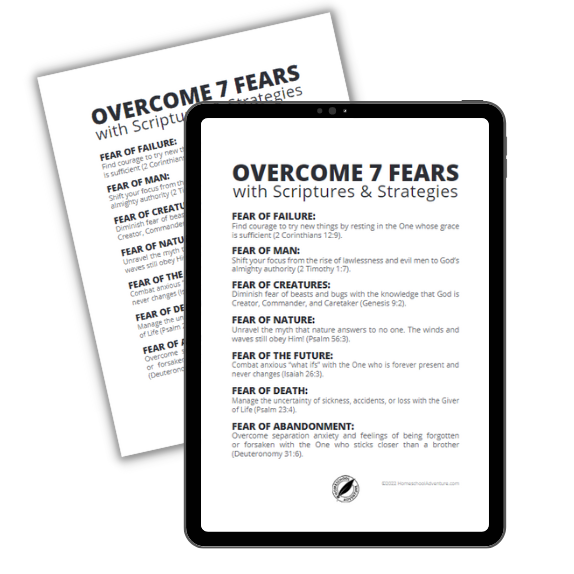Silence can be petrifying. Imagine my terror when the toddler “hid” her newborn baby brother under blankets and pillows to silence his cries.
He was still crying out, but under the piles I couldn’t hear him.
Thousands of years earlier the Israelites tried to muffle the prophets, too. Then, after the prophet Malachi, God stopped speaking. The Israelites endured 400 years of terrifying silence from God.
Today we need not fear God’s silence for He speaks through His Word. As we look at types of fear in the Bible, we discover both the character of God and how His people overcame trepidation.
Such insight can help us have victory over strongholds and persevere through present-day trials.
Two Kinds (and Causes) of Fear in the Bible
In the ESV Bible, “fear” is mentioned 437 times. Regardless of your translation, different types of fear in the Bible generally separate into two distinct categories:
- Fear of the LORD
- The Spirit of Fear
The Fear of the LORD
“The fear of the LORD is the beginning of wisdom, and the knowledge of the Holy One is insight” (Proverbs 9:10).
One of the simplest and most engaging ways to understand the fear of the LORD is to study the Hebrew names of God in the Old Testament.
The Word-nerd in me listed a few citations below, but there are thousands more you can explore on your own.
- Elohim: God, Judge, Creator (1 Sam. 2:25; Ps. 8:6; 1 Kings 18:39; Mic. 7:7)
- Jehovah Sabaoth: LORD of Hosts, LORD of Armies (Isa. 6:5; 1 Sam. 17:45; Zep. 2:9)
- El Qanna: Jealous God (Ex. 20:5; Ex. 34:14; Deut. 4:24; Deut. 5:9; Deut. 6:15)
- El Elyon: The Most Exalted God (Gen. 14:18-20; Ps. 57:2; Ps. 78:35)
When we understand that our God is the Judge, the LORD over all creation, the LORD over all armies, the jealous One to be exalted over all else—that is just the beginning of wisdom.
Simply put: Fear of the LORD is having reverence for who God is—and He is Holy.
ARE YOUR CHILDREN FEARFUL?
Help them overcome fear by faith with these Scriptures and Strategies—designed as a beautiful, printable poster.
The Spirit of Fear
Webster’s 1828 Dictionary defines fear as “a painful emotion or passion excited by an expectation of evil, or the apprehension of impending danger.”
At times, even heroes of the faith displayed a spirit of fear in the Bible, but emotion or impending danger never overwhelmed Jesus.
He neither overreacted nor underreacted to fearful situations.
- He fled from crowds trying to throw him over a cliff (Luke 4:29-30).
- He escaped the Jews trying to arrest him (John 10:39), and
- He did not recoil from suffering (John 12:27; Mk. 14:32-36).
Jesus responded judiciously and in obedience to the Father regardless of the circumstances. Though fully human, Jesus did not have a spirit of fear. This gives us hope.
“For we do not have a high priest who is unable to sympathize with our weaknesses, but one who in every respect has been tempted as we are, yet without sin” . (Hebrews 4:15)
Just as Jesus did not surrender to a spirit of fear, neither should we.
“For God gave us a spirit not of fear but of power and love and self-control” (2 Timothy 1:7) .
7 Types of Fear in the Bible & How the Enemy Uses It
As we examine several kinds of fear in the Bible, there are some ideas you may not have previously considered.
“Lack of fear leads to lack of inhibitions, to thoughtlessness, carelessness, sluggishness, and arrogance. Life without fear, like life without pain, would expose us to unidentified dangers.” – Rev. Dr. Bogumil Jarmulak
In Matthew 14, the winds were raging, and the disciples were terrified thinking Jesus was a ghost upon the water.
Only after Jesus said “come” did Peter overcome his inhibitions and step out in faith onto the water.
Fear can alert us to danger around us or within us. When that happens, ideally we’ll call upon God and grow closer to him.
Unfortunately the enemy uses fear. In doing so, he attempts to draw our focus off of God and onto the dangers around us.
While upon the sea, Peter lost both confidence and footing.
Likewise, focusing on our circumstances rather than our Savior disorders our thoughts and brings instability in our walk of faith.
Fear of Man
Man was designed by God to live in community devoid of fear, mutually giving and receiving affection and affirmation.
The first sin distorted this blessing of loving relationships and introduced the curse of power struggles. Emerging from the fall was the fear of man—a sinful craving for approval and status.
The spiritual root of this type of fear is pride.
In a culture driven by social media “likes,” fear of man has devolved further into an insatiable quest for attention.
When online, we voluntarily cede power over our spirit to strangers with no proximity nor vested interest in our well being. Our speech often becomes self-censored to avoid offense or hyperbolic to evoke response.
“Do not call conspiracy all that this people calls conspiracy, and do not fear what they fear, nor be in dread. But the Lord of hosts, Him you shall honor as holy. Let Him be your fear, and let Him be your dread. And He will become a sanctuary.”
Isaiah 8:12-14
That said, fear of man isn’t confined to the internet. Like chameleons, we often change our conduct to blend in with those around us. Such is fear of man.
“The fear of man lays a snare, but whoever trusts in the Lord is safe.” Proverbs 29:25
Fear of Danger or Death
Bands of marauding Visigoths and Vikings are relegated to history books, yet fear of danger and death is arguably more pervasive today.
Instead of doomscrolling, remind yourself that God is omnipotent.
My absolute favorite tale of danger is an obscure history lesson in 2 Chronicles 20.
King Jehoshaphat was about to be simultaneously attacked by the Moabites, Ammonites, and Meunites. The king admitted his fear, called the nation to fast, and publicly prayed:
“For we are powerless against this great horde that is coming against us. We do not know what to do, but our eyes are on you” (v 12).
God answered his humble prayer with assurance of victory. The next day King Jehoshaphat appointed people to sing praise to God and placed the army behind the chorus.
As the Israelites began to sing, the three opposing armies slayed each other:
“Behold, there were dead bodies lying on the ground; none had escaped” (v 24).
Like Jehoshaphat, it’s okay to feel powerless—your battle belongs to the LORD. The spiritual stronghold of fear is broken when we bring our burdens in prayer, rest in the sovereignty of God, and praise His name.
Fear of Failure
There is one type of spiritual fear that is especially contagious: Fear of Failure.
Moses addressed his commanders saying, “Is there any man who is fearful and fainthearted? Let him go back to his house, lest he make the heart of his fellows melt like his own” (Deut. 20:8).
Later in Israel’s history, God instructed Gideon, “Whoever is fearful and trembling, let him return home” (Judg. 7:3).
The enemy may try to use our fear to discourage others, but God calls us to “encourage one another and build one another up” (1 Thes. 5:11).
Was math brutal for you? Relearn it alongside your struggling child, and you’ll both be empowered.
Do you feel unqualified to teach history because you mix up Genghis Khan and Chaka Khan? Museums yearn for visitors who actually want to learn. Bring your student to ask questions, and they’ll both be encouraged.
We don’t have the option of leaving the battlefield. Instead “Put on the whole armor of God, that you may be able to stand against the schemes of the devil” (Eph. 6:11).
Fear of the Unknown (or the Imagination)
Abram (later called Abraham) received a promise from God that he would be blessed and made into a great nation, yet his fear of the unknown and his imagination drew him into egregious sin.
Remember the story in Genesis 12?
His wife was so beautiful that, while in Egypt, Abram imagined men would kill him to steal Sarai. To protect himself Abram lied, gave Sarai to be Pharaoh’s wife, and even financially profited from the exchange.
God’s wrath brought Abram’s sins to light. Yet, God still fulfilled the covenant He had made. God demonstrated that “if we are faithless, He remains faithful” (2 Tim 2:13).
Fifteen hundred years later, both Zechariah’s and God’s time of silence ended with the birth of John the Baptist.
No longer mute, Zechariah praised God, prophesied of the coming Savior, and recounted God’s oath to Abraham:
“…we, being delivered from the hand of our enemies, might serve [God] without fear, in holiness and righteousness before Him all our days” (Luke 1:74-75).
We too can serve without fear because Jesus—the savior Zechariah prophesied—has come.
Fear of Nature
One day the lion will lie down with the lamb, but until then much of nature has a predator-prey relationship we need to respect.
Having been in India, I know first hand some animals are huge, wild, and dangerous. That said, respecting the created does not diminish the power or authority of the Creator.
“For the creation was subjected to futility, not willingly, but because of Him who subjected it, in hope that the creation itself will be set free from its bondage to corruption and obtain the freedom of the glory of the children of God” (Romans 8:20-21- emphasis added).
When man sinned, all of creation was affected. When Jesus returns, all of creation will be redeemed.
The media’s narrative that we need to be fearful because nature is out of control is wrong.
Romans 8:20-21 tells us that God retains sovereignty over His creation, and Jesus gave the disciples an awesome glimpse of this power when He calmed a furious storm with just the words, “Peace! Be still!” (Mark 4:39).
In the Old Testament, God even promised to bless Israel’s obedience and punish disobedience through nature. Some examples?
- If man obeyed, He promised to send rain in season and produce crops so abundant they could not consume it all (Lev. 26:4,10).
- He sent hornets to drive the Amorites out of the Promised Land (Josh. 24:12).
- He directed bears to maul idol worshipers who challenged the authority of Elisha (2 Kings 2:23-24).
Yes, respect and steward nature, but don’t fear it. Instead, have Fear of the LORD who reigns over it.
“Do you not fear me? declares the Lord. Do you not tremble before me? I placed the sand as the boundary for the sea, a perpetual barrier that it cannot pass; though the waves toss, they cannot prevail; though they roar, they cannot pass over it.”
Jeremiah 5:22
Fear of the Future
Poor decision-making is just one of the effects of fear in the Bible. Nowhere is this more evident than in 1 Samuel 28.
The prophet Samuel had died, the Philistines were coming against Israel, and King Saul was afraid of the future.
Under the cover of darkness and disguise, he traveled to the Witch of Endor. She reluctantly summoned a spirit. “When the woman saw Samuel, she cried out with a loud voice. And the woman said to Saul, ‘Why have you deceived me? You are Saul.’” (v12)
Sidenote: You know you’re having a really bad day when you are rebuked by a minion of Satan for being deceptive. Now back to the story.
From the witch, King Saul learned his sons would be killed the next day, the Philistines would win the battle, and David would inherit the throne. Saul’s fear of the future was only exacerbated by his decision to engage the powers of darkness.
Over the course of his life, King Saul displayed fear of many things, but his fear of the future was his final undoing. Knowing what was to come, Saul thrust himself upon his sword and died.
Learn from Saul’s mistakes and the words in Matthew 6:34:
“Therefore do not be anxious about tomorrow, for tomorrow will be anxious for itself. Sufficient for the day is its own trouble.”
Fear of Abandonment
Accidentally leaving kids alone isn’t just the stuff of Hollywood movies. It happens, even to Joseph and Mary, and God clearly thought they were the best parental option available.
However, being temporarily forgotten is not the same as being abandoned.
Webster’s 1828 comes in handy again with the following definition:
“Abandon: To renounce and forsake; to leave with a view never to return; to desert as lost or desperate.”
According to Webster’s definition, in the book of Ruth, Naomi was truly abandoned. During a time of famine, the family left their land in Bethlehem for a “better life” in Moab. Sadly, within a decade her husband and sons were dead.
Naomi was alone with her daughter-in-law Ruth, desperate, and in a foreign land ruled by enemies of God.
On the journey back to her homeland she declared in anguish, “the LORD’s hand has turned against me!” (Ruth 1:13).
But the Bible shows us the purpose of her trials and the unfolding of God’s plan for salvation. God—through hardship—brought Naomi back to her family’s land in Bethlehem and brought Ruth into the family of God.
What’s the significance of this, you ask?
As explained in Nancy Guthrie’s book, God Does His Best Work With Empty, for an Israelite “to have property in the Promised Land was to have a stake in the promises of God to his people.”
One of those promises came from the prophet Micah:
“But you, O Bethlehem Ephrathah, who are too little to be among the clans of Judah, from you shall come forth for me one who is to be ruler in Israel, whose coming forth is from of old, from ancient days” (Micah 5:2).
What Naomi feared as abandonment was actually God’s blessing—that she might receive her inheritance, both temporal and eternal.
Ruth became the great grandmother of King David, and from his lineage Jesus Christ was born.
Like Naomi, you may cry in anguish fearing God has abandoned you, but that’s only because at the moment you can’t see the unfolding of your story.
“It is the Lord who goes before you. He will be with you; he will not leave you or forsake you. Do not fear or be dismayed” (Deuteronomy 31:8).
In closing, I leave you with this recommendation:
If you struggle with fear of abandonment or any of the other types of fear in the Bible, memorize Scripture to reflect upon.
Like my newborn who just kept screaming or the prophets of old who could not be quieted, when you hide God’s Word in your heart, the enemy cannot silence you from speaking truth—even if only to yourself.
Help your children hide God’s Word in their hearts—and overcome fear—with our new resource, Overcoming Fear:


